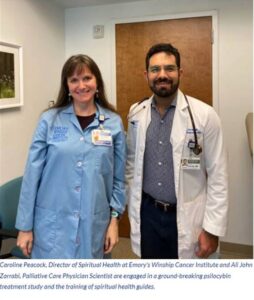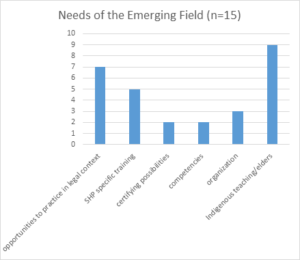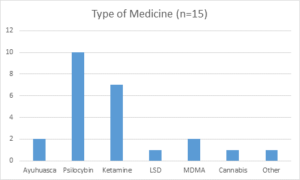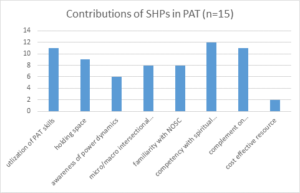Psychedelic assisted therapy (PAT) is a field led predominantly by mental health practitioners and physicians serving in the therapist roles.(1) Although there is a long history of spiritual and religious leaders utilizing psychedelics for therapeutic purposes(2), Spiritual Health Practitioners (SHPs) have not been routinely integrated into PAT interdisciplinary teams. SHPs are primarily on the sidelines, but have a great deal to offer to the field.(3) The aim of my IRB approved study was to raise awareness about role of SHPs within PAT in legal contexts with the goal of increasing inclusion within the existing care teams as equal partners.

I interviewed fifteen SHPs who have engaged PAT in a variety of contexts with a variety of psychedelic medicines. Results of the study included reflection on the role, function and experience of SHPs in PAT.
One of the primary findings of the study was the perception of SHPs’ contributions to PAT. The following categories emerged as themes of contributions of SHP: (1) SHP utilization of PAT skills; 2) holding space; 3) complement on interdisciplinary team; 4) awareness of power dynamics, 5) micro/macro intersectional awareness, 6) familiarity with NOSC, and 7) competency and training to work with spiritual material. An outlying theme was that SHPs are a cost effective resource in PAT.
One participant explained:
“I feel like chaplains are trained to hold the unexplainable, the mystery, the weird, the liminality. So much about my training as a chaplain is just being with, witnessing, holding, supporting without needing to fix or change or anything… it’s just really a process of allowing. I really see us as doulas in a lot of ways- like there are death doulas and birth doulas- but we are almost like psychedelic experience doulas that can just be present, with the experience and support without needing to get in there with any concrete tools. Whereas I think counselors and other medical professionals have maybe a different approach, but I think spiritual care providers/chaplains bring so much to the psychedelic experience in terms of holding space.”
This participant discussed the inner process of the professional engaged as a therapist in PAT, which is an essential area of attention for persons engaged in ministry and the spiritual health professions. In a similar statement, another participant described how this inner way of being is the heart of the work of the therapist:
“In a high dose session a person will feel that he or she is dying or going crazy, so to be able to trust is incredibly important and to establish that depth of trust in just a few hours requires very skilled therapist and that’s why when I teach people how to be a psychedelic therapist… the emphasis is more on the being of the therapist than on the technique. It’s not something you read in an outline of some kind of book and then imposed on people. It’s a quality of being in the world.”
A related contribution was the capacity of SHPs to hold the space of reverence/respect in the presence of the medicine patient. One participant drew a parallel with doulas:
“I feel like chaplains are trained to hold the unexplainable, the mystery, the weird, the liminality. So much about my training as a chaplain is just being with, witnessing, holding, supporting without needing to fix or change or anything… it’s just really a process of allowing. I really see us as doulas in a lot of ways- like there are death doulas and birth doulas- but we are almost like psychedelic experience doulas that can just be present, with the experience and support without needing to get in there with any concrete tools. Whereas I think counselors and other medical practitioners have maybe a different approach, but I think spiritual care providers/chaplains bring so much to the psychedelic experience in terms of holding space.”
Meaning and Fulfillment
Many participants shared that they find deep and profound meaning and fulfillment in the work of PAT. The most significant area of meaning for participants (10 out of 15) was found through witnessing the relief of suffering of others. One participant spoke of the meaning they find in the work:
“Being in the work with other people as their lives unfold, helping them be grounded…helping them see beyond their depression and anxiety to the inner resources that they’ve always had but they forgot they had. With psychedelics this process is often illustrated very dramatically and vividly where people are discovering parts of their mind they hardly knew existed. They’re experiencing the healing of the traumas and the problems that have contributed to addictions or depression or anxiety, or whatever it is. So the psychedelics in a way, make it more vivid, more intense. But it’s basically the same process and it’s incredibly meaningful to me always has been to just be beside someone…grounding them in the therapeutic journey.”
Needs of emerging field

I invited participants to explore what the emerging field may be in need of, and participants provided the following responses: 1) indigenous teaching/elders, 2) organization, 3) competencies for chaplains in PAT, 4) certifying possibilities, 5) chaplain specific training, and 6) opportunities for chaplains to practices PAT in a legal context. One participant delighted at this question and stated:
“It’s wonderful to think of it as a field that really exists already like the baby’s been born and it’s up- we’re claiming it. Maybe as with any other group it what it needs is wisdom, not professional insecurity, like, I have to carve out my niche in the world and defend myself. So much as I accept that I have gifts to give up, and I want to be part of the community of effective well trained psychedelic therapist guides, facilitators, shamans, call them whatever you want. Welcome to the club, we need you in. Be in community with the whole professional world. We have gifts to give one another.”
The following response encouraged welcoming indigenous wisdom into this work:
“I would personally love there to be some kind of elder council that is culturally rooted and appropriate in indigenous cultures that work with medicine and have some kind of spirit of reciprocity and support and guidance from indigenous communities around this work- specifically around how to hold this in sacred context, which relates to chaplaincy. We might have chaplains coming into this work that might have a very different religious or spiritual view of thing, but I also trust in the in the CPE world there is this sort of commitment to diversity and honoring of difference. And, I would really love to see more of that indigenous wisdom guiding this work because that that feels congruent to the tradition of using this medicine in a spiritual way. It really honors the work as spiritual. It’s not just psychological and gives us a larger context…I feel strongly about that and how that happens…I’d love to have an kind of council of elders that I could go to and say, “This is what we’re seeing…How do we hold? What’s the best wisdom going forward?” And maybe we’re going to end up being those elders. In some ways the older I get…I guess, we’ll have to do it.”
In similar fashion, the following interviewee covered a wide variety of suggestions for the emerging field, including having a cautious space, communities of practice for dialogue, and experiential learning opportunities. One interviewee expressed their wish that theological schools and seminaries would awaken to the experiential component of religion, including through exploration of the benefits of psychedelic medicine.
There were ma ny more areas of exploration in this study, including perceptions of positive and negative spiritual outcomes of psychedelic experience, attitudes about personal experience with psychedelics in order to be an effective guide, as well as perspectives on what communities that utilize psychedelics ritually can offer to those in clinical contexts.
ny more areas of exploration in this study, including perceptions of positive and negative spiritual outcomes of psychedelic experience, attitudes about personal experience with psychedelics in order to be an effective guide, as well as perspectives on what communities that utilize psychedelics ritually can offer to those in clinical contexts.
Ministry application
Throughout the development of this research study, I engaged in the creation and facilitation of the Transforming Chaplaincy Psychedelic Care Network(4) in collaboration with a leader from Naropa’s Center for Psychedelic Studies(5)(10), Dr. Jamie Beachy. This network convenes in a monthly gathering of spiritual care professionals and researchers engaged in, or seeking to learn about PAT in healthcare contexts. We have over 140 people registered with our network.
Looking to the future
In the coming years, medicines such as MDMA and psilocybin are likely to become FDA approved for specific medical and mental health conditions. When that time comes there will be significant demand for trained clinicians to provide these modalities. Organizations that are stepping forward to offer certification(6, 7) would benefit from becoming aware of the value of SHPs in PAT and offer a designation for this discipline. Training programs can also create opportunity specifically for SHPs, as well as prepare all their trainees in matters relating to spirituality in psychedelic experience. SHPs, their colleagues from other healthcare disciplines, and researchers would do well to advocate for the presence of SHPs within emerging clinical trials to solidify the presence of SHPs within protocols.
Psilocybin Assisted Therapy room at Emory Brain Health Center
Emory’s cutting edge ministry
Concurrent to engaging my DMin research, I have had the privilege of serving as a spiritual health clinician on a psychedelic assisted therapy interdisciplinary team with Emory Center for Psychedelics and Spirituality. We offer supportive and healing care to cancer patients experiencing demoralization and chronic pain. My hope is that through enhancing the field of psychedelic assisted therapy with the perspectives and skills of SHPs, patients at more institutions will be able to receive similar holistic, effective care, thereby easing the burden of more persons who are suffering.
Resources for further education:
Center for Psychedelics and Spirituality Home | Emory University | Atlanta GA
Center For Psychedelic Studies – Naropa University
Philanthropy at the Edge | Riverstyx Foundation
Johns Hopkins Center for Psychedelic and Consciousness Research (hopkinsmedicine.org)




